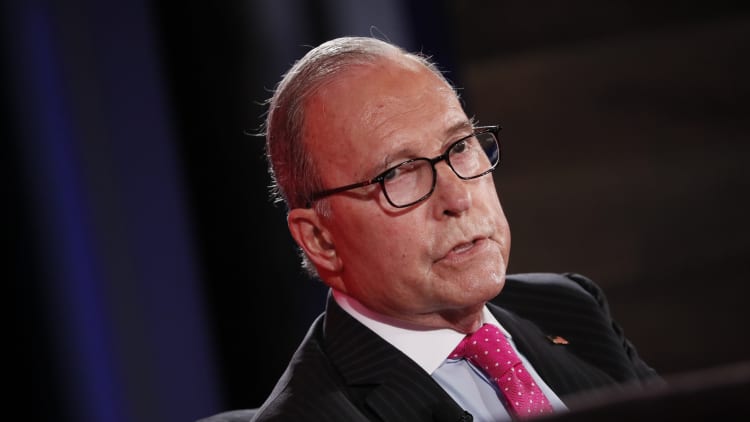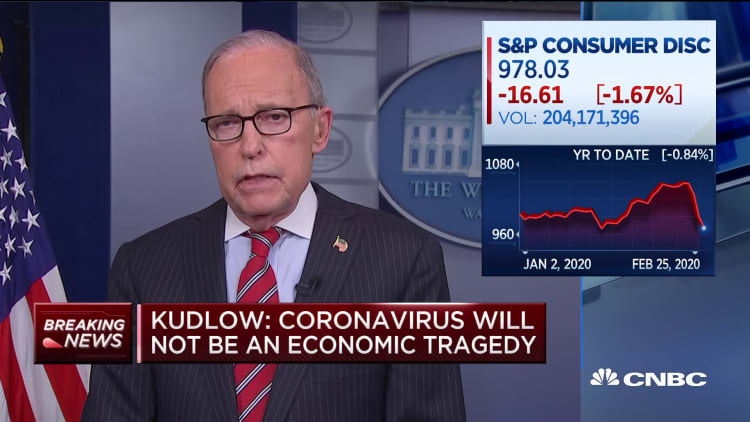
President Donald Trump's top White House economic advisor, Larry Kudlow, said Monday that he no longer thinks the U.S. has the deadly coronavirus "contained," as he said less than a month earlier.
Asked on Feb. 25 about the spread of the COVID-19 virus, which is believed to have originated in the Chinese city of Wuhan, Kudlow told CNBC that the Trump administration has kept the U.S. "pretty close to airtight."
On Monday – as more than 35,000 cases and at least 470 deaths from the virus were confirmed in the U.S. – Kudlow said, "I've changed my view."

"Nobody could have predicted or expected this," Kudlow said on CNBC's "The Exchange."
Kudlow, director of the National Economic Council, said that he had claimed the coronavirus was contained in the U.S. "right after the president boldly put travel restrictions on China."
Trump declared the coronavirus a public health emergency on Jan. 31, and imposed some travel restrictions and quarantine measures for individuals coming into the U.S. from abroad.
"When I said that, it was true, factually," Kudlow added. "I'm as good as the facts. The facts changed, of course I've changed my view."
But high-level officials, including some within the Trump administration, were warning of the grave threat posed by the virus even before Kudlow's late-February remarks.
On Feb. 25, the same day of Kudlow's comments, Dr. Nancy Messonnier, director of the National Center for Immunization and Respiratory Diseases, said that "Ultimately, we expect we will see community spread in this country."
"It's not so much a question of if this will happen anymore but rather more a question of exactly when this will happen and how many people in this country will have severe illness," Messonier said during a Centers for Disease Control and Prevention media briefing.
Three days before Kudlow claimed the virus was contained, White House coronavirus task force member Dr. Anthony Fauci said on CNN: "At this particular moment ... the risk is very low. But, and I have to underline 'but,' this could change, and it could change rapidly."
"If this evolves into a pandemic, there's no way we in the United States are going to escape having more infections in this country," Fauci, director of the National Institute of Allergy and Infectious Diseases, said in that Feb. 22 interview.
The World Health Organization classified the coronavirus a pandemic on March 11.
Kudlow's latest remarks came as U.S. officials at every level scrambled to stem the spread of the coronavirus by implementing draconian emergency measures that threaten to cripple the economy.
Some state leaders have forced nonessential businesses to shut down, prohibited large gatherings and ordered residents to stay in their homes.
Those prescriptions are meant to promote so-called social distancing practices that can slow or prevent transmission of the disease – but are likely to have dire consequences for markets, employers and workers.
Fears about the impact of the virus have sent stocks drastically lower over the past month: The Dow Jones industrial average, for instance, wiped out all its gains since Trump's election in November 2016.
Meanwhile, lawmakers on Capitol Hill have passed multiple bills providing emergency funds to combat the spread of the disease and soften the blow for affected Americans. But the largest stimulus package, which is expected to cost well over $1 trillion, has hit roadblocks in Congress as Republicans and Democrats lock horns over what should be included.
The massive funding bill again failed a key procedural vote in the Senate on Monday.



